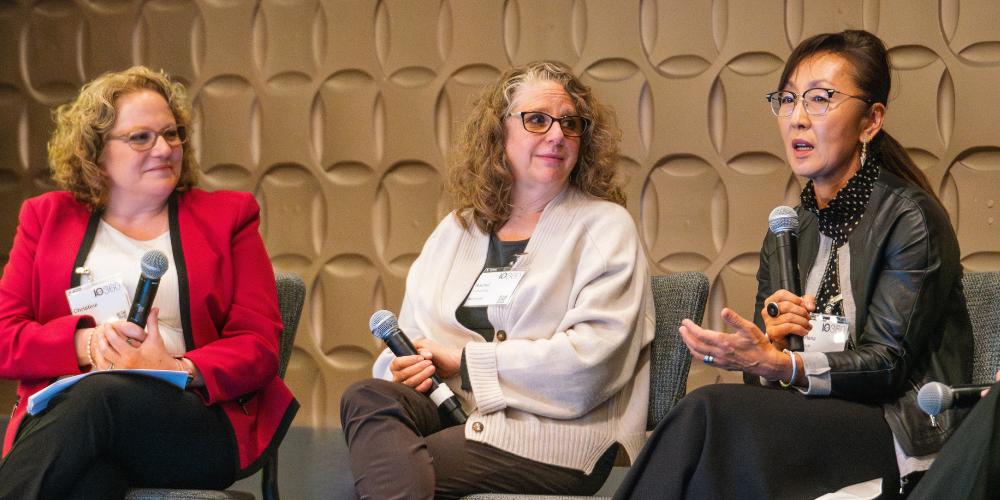Merck's Mission for More Effective Breast Cancer Immunotherapy Treatments
Vassiliki Karantza, MD, PhD, Merck, gives insight into what using pembrolizumab in other indications taught her about breast cancer treatment. She is AVP, Global Clinical Development at Merck, leading the Breast Cancer subsection of Women's Cancers.

What is the work you’re leading at Merck?
I am the Breast Cancer Sub-Section Head within the Women’s Cancers Section at Merck. Our mission is the development of more effective treatment paradigms for all breast cancer subtypes in all settings, including both metastatic and early-stage disease.
“Triple-negative breast cancer was the first breast cancer subtype to be tackled with immunotherapy, as it is considered more immunogenic than the other two main breast cancer subtypes."
What is the process of developing a new paradigm treatment?
I was very fortunate to join Merck at the time when the first data using Keytruda for the treatment of breast cancer became available in 2014. It was a small cohort of patients with heavily pretreated metastatic triple-negative breast cancer in a bigger multi-cohort study looking for proof-of-concept signals in different malignancies. Based on promising data from the breast cancer cohort of 32 patients, we started investigating pembrolizumab as a treatment for triple-negative breast cancer with a Phase II clinical trial, and then expanded the Breast Cancer Program to three Phase III trials.
In two of these studies, KEYNOTE-355 and KEYNOTE-522, the regimen that included Keytruda did better than what was standard-of-care treatment at the time of study start for patients with previously untreated metastatic disease and for patients with early-stage disease, respectively. In KEYNOTE-355, the addition of pembrolizumab to chemotherapy extended the overall survival for patients with metastatic triple-negative breast cancer compared to chemotherapy alone.
In KEYNOTE-522, pembrolizumab in combination with chemotherapy given before surgery and then continued as a single agent after surgery, for a total pembrolizumab administration of one year, resulted in longer survival without disease progression before surgery or a recurrence after surgery. These two studies led to approvals of pembrolizumab for the treatment of metastatic and early-stage triple negative breast cancer by FDA in 2021. Pembrolizumab plus chemotherapy has now been approved in 30+ countries for patients with PD-L1-positive triple-negative breast cancer, whereas the early-stage regimen is under review by multiple regulatory agencies in the world, including the EU and Japan.
We started the process in 2014, and we got our approvals in 2021.
What did using a previously approved immunotherapy for other cancer types, such as melanoma and lung cancer, in a new indication elucidate about how breast cancer operates?
A drug like pembrolizumab re-activates the immune cells in the tumor and ultimately leads to cancer cell death and tumor shrinkage. We have found that tumors infiltrated with more immune cells are more responsive to immunotherapy. As a result, pembrolizumab can potentially work in many tumor types, so long as there are immune cells present, but the effectiveness may be different. It is not a coincidence that pembrolizumab was first approved in melanoma and lung cancer, which are inflammatory tumors with many immune cells.
Breast cancer is not a very immunogenic cancer and is generally not so responsive to single agent immunotherapy. However, when combined with chemotherapy, pembrolizumab becomes more active in breast cancer as the killing of cancer cells by chemotherapy brings more immune cells into the tumor. Triple-negative breast cancer was the first breast cancer subtype to be tackled with immunotherapy, as it is considered more immunogenic than the other two main breast cancer subtypes. It is also a cancer with a high unmet medical need, as patients with triple-negative breast cancer generally have poor prognosis and short overall survival after their disease becomes metastatic.
What led to the transition from academia to industry?
After several years, I decided that it would be great to do clinical trials on a much bigger scale, and potentially have an impact on the lives of many more patients. So, I transitioned to industry and joined Merck. When I first started my higher education studies, I could not foresee where this journey would ultimately take me. I have been very fortunate, and I am grateful that I was at the right place at the right time. I certainly had the opportunity of a lifetime to play a major role in the clinical development of pembrolizumab in breast cancer from the very beginning of Phase I data interpretation all the way to bringing it to patients as a component of more effective treatments for triple-negative breast cancer.
"Building a successful breast cancer program at Merck was due not only to a great drug, such as pembrolizumab, but also due to a dedicated team of many individuals who greatly enjoy what they are doing and are experts in it."
Is there a piece of advice you often come back to over your career?
The first piece of advice I was given was to do something that really interested me. Because no matter what one works on, there are always difficulties. And one needs to remain involved, focused and committed even during a time of adversity. Doing what one truly likes and is deeply interested in is paramount.
Another advice I was given when I joined Merck was to be very good at what I did. I was told “find your niche and be very good at it to be considered an expert”. It wasn’t too difficult for me to do well in breast cancer, as I already knew it clinically and had done relevant research. However, I still strived for a deeper knowledge of the disease and a solid understanding of drug development in industry. Building a successful breast cancer program at Merck was due not only to a great drug, such as pembrolizumab, but also due to a dedicated team of many individuals who greatly enjoy what they are doing and are experts in it.
Do you have any thoughts on how to encourage young women entering STEM fields?
To any young woman who is contemplating entering STEM, I would like to say: “If this is the field that deeply interests you, you should pursue it. Do what you like most, as this will keep you driven and lead to success”.
Getting to the approval of Keytruda in triple-negative breast cancer was not an easy task. For seven years, we had a lot of ups and downs. A major reason we kept going and persevered despite the difficulties and setbacks was that the team members were working on what they mostly liked, were good at it, and remained committed to helping patients.
For more information on IO360º Summit, visit io360summit.com.









